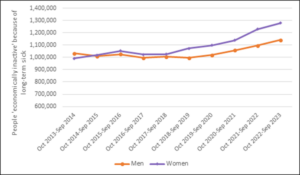Press Releases
Government won’t close gender labour market gap without tackling rise in women’s ill health, says WBG
Date Posted: Friday 9th February 2024
Latest ONS figures reveal that over a quarter of working-age women are economically inactive, compared to less than a fifth of men. While the total labour market participation gap is slowly narrowing, the trend of higher numbers of women than men becoming economically inactive due to long-term sickness has reached a five-year high.
- Women’s overall economic inactivity rate of 25.1% is significantly higher than men’s at 18.5%.
- This is partly due to caring responsibilities: 26% of women between the age of 16 and 64 were economically inactive due to looking after their family or home, compared to 7% of men.
- An estimated 1.5 million women in the UK are economically inactive due to long-term sickness compared to 1.3 million men, a gap of 200,000 more women. This continues a five-year trend of higher numbers of women than men exiting the workforce due to health issues.
Figure 1 – Levels of economic inactivity due to ill health have been rising more among women than men

Source: Nomis
Emma Thackray, Research and Data Officer at WBG, said,
“The latest ONS data show a continued rise in the number of working-age people being out of work due to ill health. The trend of higher numbers of women than men in this category should cause additional concern, especially when we know that closing the labour market participation gap could contribute £88.7bn to the economy.[1]
“Women face a double whammy, being more likely to be out of the labour market to care for children and relatives and to experience ill health themselves. When they are in the labour market, women are more likely to be in part-time and insecure work, often to juggle their caring responsibilities.
“The Government has acknowledged the need to address the rising numbers of those classified ‘economically inactive’ but rather than fix the glaring fractures in our social infrastructure, they’ve ramped up punitive benefit sanctions which have been proven to be ineffective.”
“We need to see greater investment in health services including mental health support, so people are well enough to return to work. We need policies that improve pay and conditions for those in low paid and part-time work so they can work to their full potential. And we need policies that reduce and redistribute the amount of unpaid care falling on women’s shoulders like better parental leave policies, a reformed childcare system and investment in social care.”
“If we want a healthy economy, we need a healthy and rested population.”
Helen Walker, Chief Executive at Carers UK, said:
“Today’s analysis from the Women’s Budget Group is a worrying reminder that women disproportionately shoulder the bulk of unpaid caring responsibilities in the UK.
“Of the 5.7 million unpaid carers looking after an ill, elderly or disabled relative, 59% are women. And for women out of work with caring responsibilities, the cost-of-living crisis has plunged many into poverty. Thousands are struggling to make ends meet and many are at greater risk of poor health as they cut back on essentials such as food and heating.
“For women in work, juggling employment with their caring responsibilities can be very tough. We know women are more likely to be in part-time and insecure work such as zero-hours contracts, often to take on caring responsibilities. This leaves working women who are unpaid carers more vulnerable to loss of earnings and even dismissal.
“The new Carer’s Leave Act which comes into force in April this year will offer some protection to working women, granting up to five days unpaid leave to carers and offering the same rights as other forms of family leave (i.e. parental and maternity leave).
“But if carers are to be properly supported, all parties must recognise the enormous societal and economic value that people looking after family and friends provide.
“It is estimated that the value of unpaid care in England Wales alone is the equivalent of a second NHS – a staggering £162 billion per year. Ensuring carers – including women – have access to practical support, can prioritise their own health and wellbeing while caring, and remain financially resilient is crucial for the overall health of the country.”
ENDS
Spokespeople from WBG and Carers UK are available for interviews and case studies are available from Carers UK.
Contact
Erin Mansell, Head of Communications and Public Affairs at WBG press@wbg.org.uk
Notes to Editors
The UK Women’s Budget Group (WBG) is the UK’s leading feminist economics think tank, providing evidence and analysis on women’s economic position and proposing policy alternatives for a gender-equal economy. We act as a link between academia, the women’s voluntary sector and progressive economic think tanks.
- Today WBG has published a briefing on Women and the Labour Market, the first of a series, examining ONS headline measures of employment, unemployment and economic inactivity through an intersectional lens: https://wbg.org.uk/wp-content/uploads/2024/02/Women-and-the-Labour-Market-Briefing-I.pdf
- [1] https://cles.org.uk/news/88-7bn-per-year-the-cost-of-barriers-to-paid-work-for-women/
Carers UK is a leading national charity for unpaid carers. We support, advocate, champion and connect unpaid carers across the UK so that no one has to care alone.
- 59% of unpaid carers are women (Census 2021). Women are more likely to become carers and to provide more hours of unpaid care than men. More women than men provide high intensity care at ages when they would expect to be in paid work (Petrillo and Bennett, 2022)
- Key Facts and Stats – https://www.carersuk.org/policy-and-research/key-facts-and-figures/

